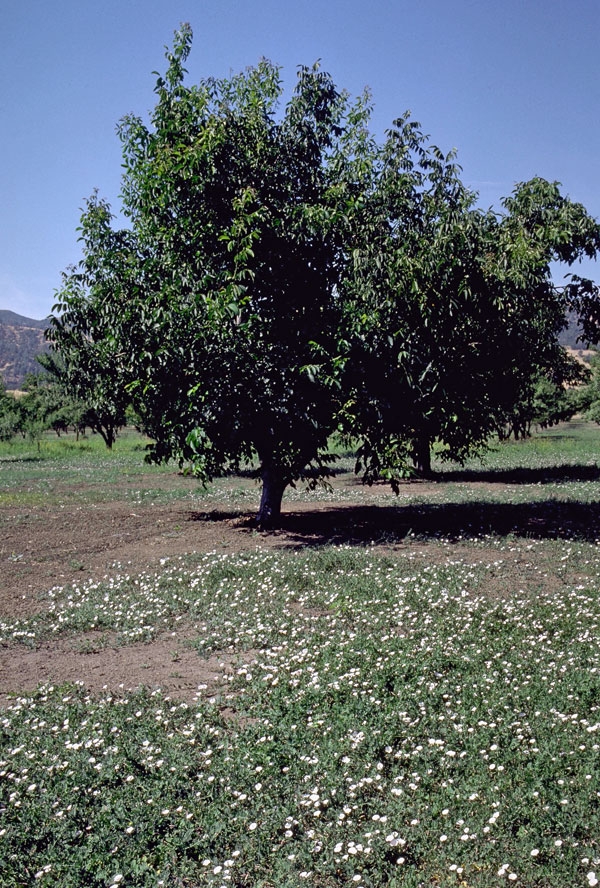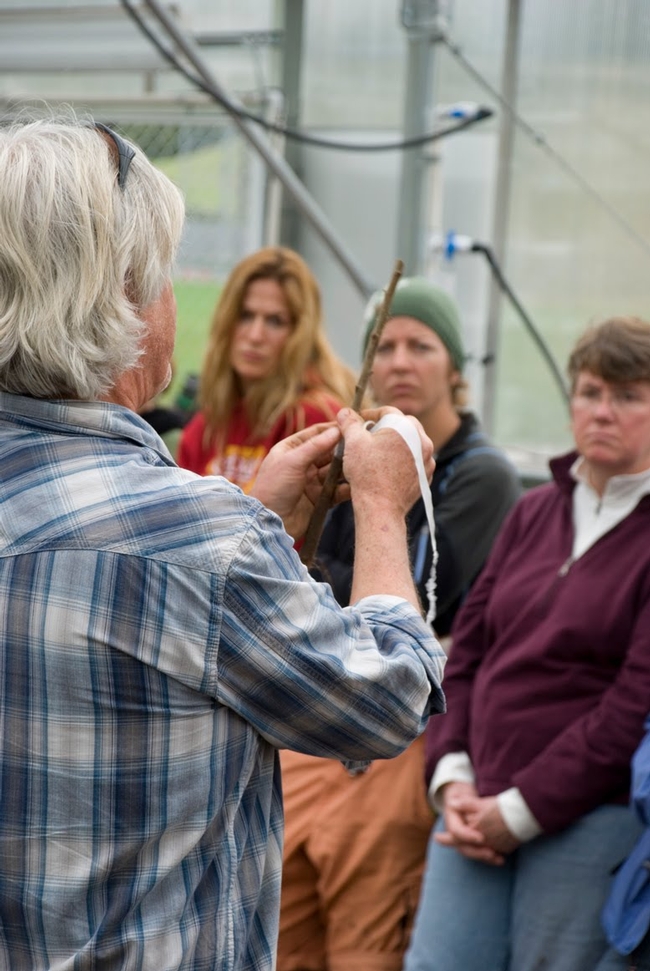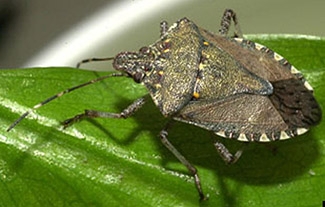Posts Tagged: organic
UCCE helps organic farmers confront weed control challenges
Organic weed control in orchards is far more difficult than conventional weed control, reported the Daily Democrat. The story was written by Bob Johnson for AgAlert.
The most effective organic approach to weed control is a combination of cultural practices and organic herbicides, said John Roncoroni, UC Cooperative Extension advisor in Napa County, at a pear weed control field meeting.
"This is the wood mulch from last year," Roncoroni pointed out at the field day. "As you can see, the grass is growing on the edges, but it's held up pretty well. This is after a year, but it will break down."
Roncoroni is testing the use of spot applications of organic herbicides in combination with mulches.
"Bindweed is pushing through the wood chip mulch," Roncoroni said. "The mulch is a foot deep, but the bindweed rhizomes are six feet deep."
Rachel Elkins, UCCE advisor in Lake and Mendocino counties, also spoke at the field day. She advised cleaning up weeds conventionally and then converting orchard ground management to organic methods.
"You shouldn't have any weeds within two or three feet of young trees," Elkins said. "It's like growing two crops - you need enough water and nitrogen for the trees and the weeds.
Yuba-Sutter almond harvest prices better this year
Ashley Gebb, The Appeal Democrat
The 2012 almond harvest is expected to be smaller than last year for some farmers, but hopes are for higher prices.
"The crop is not all the way in, so this is strictly rumor, but it seems the crop is a little bit off so price seems to be up a bit, which is good for growers," said Franz Niederholzer, UCCE advisor in Yuba and Sutter counties. "I'm not sure where it will work out with increase in price versus loss in income for reduced yield."
Organic training farm gets funds
The College of Marin received a $233,000 grant from the California Community College Chancellor's Office, which will help the school support its organic farm until it becomes self sustaining, according to an article in the Marin Independent Journal.
The college launched the farm in 2009 as a kind of laboratory to help Marin residents and others learn the essentials of organic farming from experts like the University of California Cooperative Extension's Steve Quirt and Wendy Johnson of Green Gulch Farm, the story said.
State inspectors have been cracking down on the use of unpaid labor on California farms — ending an informal tradition of agricultural apprenticeship. The College of Marin program has emerged as an option for those who want hands-on organic farming experience.
Feared Eastern pest found in California
Growing Produce
Brown marmorated stink bug (BMSB), Halyomorpha halys Stål, was recently found in San Luis Obispo County in an incoming shipment of household items from Pennsylvania, where it is considered a serious pest. The ag commissioner’s office took immediate action to eradicate this intruder by physical removal and chemical treatments. For more information, the Growing Produce website referred readers to a post by UC Cooperative Extension strawberry and vegetable crops advisor Surendra Dara in his Pest News Blog.
Dan Marcum encourages farmers to 'diversify their portfolios'
Since the 1970s, UC Cooperative Extension farm advisor for Shasta and Lassen counties, Dan Marcum, has been working alongside farmers - particularly the risk-takers and early adopters - to test new crops and pest controls, according to a feature in the Redding Record-Searchlight.
He won their trust, the story said, with his practical knowledge of farming and work ethic.
"Dan works harder than most of the farmers in his area," the story quoted fourth generation Fall River grower Travis Corder.
Over the years, Marcum has undertaken myriad efforts to help the region's farmers diversify their crops, wrote reporter Tim Holt. For example:
- He took farmers on a field trip to the University of Minnesota to learn how to grow short-season wild rice
- He led a field trip to Central Oregon to look into the possibility of growing peppermint
- He has worked closely with farmers to develop economically viable organic pest control methods
- He is experimenting with cold-weather winegrape varieties that can be planted successfully by smaller growers for personal use and possibly to sell to wineries
"Crop diversity is like diversifying your stock portfolio. It helps growers survive the ups and downs of wholesale prices for any one crop," Marcum was quoted.

Wild rice is a crop Northern California farmers can use to diversify their portfolios.
First-of-its-kind organic farming apprenticeship launched
An organic farming apprenticeship program has been established in Novato, Calif., to teach students progressive, responsible farming practices including landscape ecology, composting and fertility management, according to a news release distributed by the California Division of Apprenticeship Standards (DAS).
This is the first organic farming apprentice program in the nation, the release said. The Organic Farming and Gardening Apprenticeship Program includes 1,800 hours of hands-on paid training at Fresh Run Farm in Bolinas and 11 courses of related instruction provided by College of Marin.
According to the release, the organic farming industry is the fastest growing sector in agriculture. Marin County has 23 registered organic producers that farm 810 acres of land.
The College of Marin also maintains a 5.8-acre Indian Valley Organic Farm & Garden, which is a partnership involving the Conservation Corps North Bay, the University of California Cooperative Extension and the College of Marin.
Apprenticeship training dates to ancient times when young boys were indentured to skilled tradesmen to learn a craft, according to DAS website. Today, apprentices are women and men who earn while they learn through planned, supervised work on-the-job combined with related classroom instruction.
"Just like college, apprenticeships aren’t for everyone," the website says. "Apprentices get up early, take direction from journeypersons, follow precise safety standards and attend classes at night. But at the end of their apprenticeship they get a ticket to a career anywhere they care to go."

Students work at the Indian Valley Organic Farm & Garden
Ag is a key part of California communities' identities
News stories from around the state demonstrate the role of UC Cooperative Extension in helping define California's agricultural "sense of place."
Salinas research corridor
Officials are working together to create a "research corridor" in Salinas to work in concert with existing agricultural and construction technology centers, said Salinas Mayor Dennis Donohue in his state-of-the-city address. "I want to acknowledge the very real and sustained efforts to make a Research Corridor a reality by Dr. Phoebe Helm at Hartnell, Sonya Varyea Hammond of the UC Extension and Congressman Sam Farr," Donahue said, according to a transcript of his speech on the Fox 35 news website. "The City will continue to stand with and actively support their efforts to help move the public sector's role in the future we envision. The marketplace will ultimately move the agenda forward but the public sector plays a crucial role."
Organic agriculture
California is the No. 1 place for organic agriculture in the nation, according to a survey analyzed by UC Cooperative Extension agricultural economist Karen Klonsky. UC Davis news service issued a news tip about the analysis that was picked up widely in the media. The survey found that California leads the United States in the number of organic farms, the amount of land in organic production and in organic sales. California is home to 19 percent of the nation’s organic farms and accounts for 36 percent of the country’s organic sales.
Rural identity
The U.S. census reports that population in Yolo County has grown, but the place maintains its "rural" designation, reported the Woodland Daily Democrat. Government agencies usually identify counties as rural if the population is under 200,000, the story said. Even though Yolo County, the home of UC Davis, topped that number by 849 individuals, it is still considered rural because of the important role of agriculture in the community, county administrator Patrick Blacklock told the paper.



